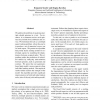Free Online Productivity Tools
i2Speak
i2Symbol
i2OCR
iTex2Img
iWeb2Print
iWeb2Shot
i2Type
iPdf2Split
iPdf2Merge
i2Bopomofo
i2Arabic
i2Style
i2Image
i2PDF
iLatex2Rtf
Sci2ools
116
click to vote
NAACL
2007
2007
Multiple Aspect Ranking Using the Good Grief Algorithm
We address the problem of analyzing multiple related opinions in a text. For instance, in a restaurant review such opinions may include food, ambience and service. We formulate this task as a multiple aspect ranking problem, where the goal is to produce a set of numerical scores, one for each aspect. We present an algorithm that jointly learns ranking models for individual aspects by modeling the dependencies between assigned ranks. This algorithm guides the prediction of individual rankers by analyzing meta-relations between opinions, such as agreement and contrast. We prove that our agreementbased joint model is more expressive than individual ranking models. Our empirical results further confirm the strength of the model: the algorithm provides significant improvement over both individual rankers and a state-of-the-art joint ranking model.
Aspect Ranking Problem | Computational Linguistics | Multiple Related Opinions | NAACL 2007 | Ranking Model |
Related Content
| Added | 30 Oct 2010 |
| Updated | 30 Oct 2010 |
| Type | Conference |
| Year | 2007 |
| Where | NAACL |
| Authors | Benjamin Snyder, Regina Barzilay |
Comments (0)

